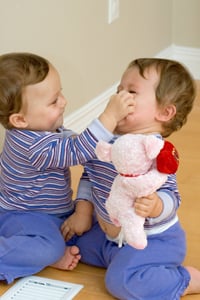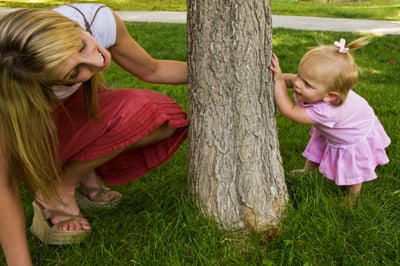Toddler behaviour – Common inappropriate behaviours
It is exciting watching our precious children grow and develop in so many different ways. In the first few years of life they learn an incredible amount of things, from language, control over their bodies, walking and gradually becoming independent. Some of the things that children learn, are taught by us (such as family routines) and some develop naturally (e.g. learning to eat solid food).
One of the areas that are emerging at this time is a toddler’s social development. The social development of a toddler can be quite complex, and we need to keep in mind that while our children are sponges in terms of learning at this age, they have obviously not mastered everything (nor should we expect them to!). Social skills are learned through experience and teaching, and we need to be patient to gain an understanding of what they are, and are not, capable of doing.
Below are some common behaviours that toddlers may engage in when they are in social situations. These are developmentally appropriate and are an important learning phase for your child.
Snatching and Grabbing
As parents, when we see our child “snatch” a toy from another child, often we are mortified! Many of us worry that our child is becoming a bully and that we need to step in and change their behaviour. However, a young child is not capable of being selfish at this stage, they simply see something that they want, and they take it. They have no insight as to how the other child may feel. In fact, it is an interesting point that often the other child does not protest. Again, we start worrying that our child is learning to be a “victim” and should stand up for themselves. In fact, our child is often quite interested in watching the other children play with their toys. However this “tolerance” starts changing in their second year.
- Parents can:
Learn not to stress during this phase. It is a normal part of this developmental stage. However, if this continues past toddlerhood, then keep an eye on things – the difference between “naughty” and “developmental” is the intention of the child.
Biting, Fighting and Hitting
Toddlers have limited language skills, and they have not yet learned appropriate ways of expressing their feelings. When a toddler is upset, angry or frustrated, they often show this physically. This is their way of coping with these difficult emotions, and often they will take it out on whoever is nearby – even if they are not the offender!

- Parents can:
Teach the child a “feelings vocabulary”. If the child can use language to tell you how they are feeling, they are less likely to respond physically to the emotion. An example might be if your child starts becoming physically aggressive because their blocks fell down. You can help them label their emotion by saying, “it is really frustrating when you have worked so hard and built it really high and then it falls over. Of course you feel angry.”
Parallel Play
Toddlers are not yet able to develop friendships in the way that adults can, but they can enjoy the company of others. It is a common scene in pre-schools and play groups to see young children playing alongside each other but not actually playing with each other. Often they are watching what the other child is doing, and may imitate some of their behaviours.
- Parents can:
Give them plenty of opportunities to interact with children (and adults!) of all ages. Toddlers love to mimic, and they are also absorbing information on how they should behave by watching and studying how others act and react to situations. Parents can ensure that they are modelling the behaviours that they would like their child to engage in. Just remember: If you yell and scream when things do not go your way, or argue if someone else asks you to put the washing out, your child sees this behaviour as appropriate and is looking to you as their ideal role model.
Social Language
Children can be shown ways of speaking to others. Some of the important words are “please” and “thank you” or something close to those. While these words may not make a difference while interacting with other toddlers, they are an essential addition to their vocabulary when dealing with older children or adults. Also helping children as they get older to ask to play with others, or using words to understand ‘taking turns’ in games.
- Parents can:
Play with your children! While taking turns does not develop for a while, it is certainly possible to teach (by modelling) a toddler to say “thanks” every time you pass him/her a toy, or for the child to say “please” when he/she wants something. Again, this may not develop for a while, but if it becomes a habit for you, then your child is more likely to learn it by themselves. Children respond well to routine and using appropriate manners is a habit that will serve them well!


